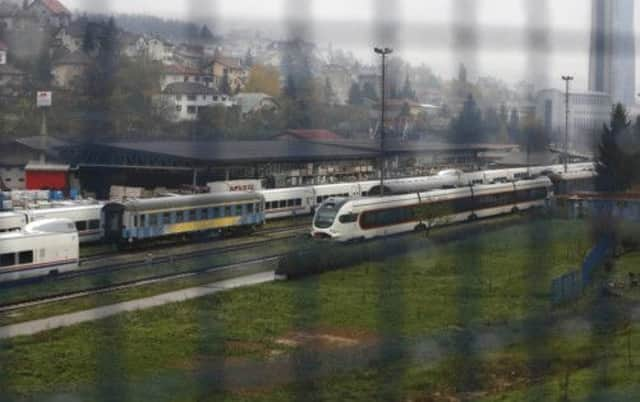£57m trains Bosnian rail can’t handle


The nine super-fast trains that Bosnia bought from Spain for €67.5 million (£56.5m) boast a maximum speed of 150 miles per hour – but they have been stored on a siding in Sarajevo since they arrived from the factory of Spain’s Talgo company.
Meanwhile, passengers travel on trains that are 40 years old, running at a maximum speed of 45mph, and also have to pay back the loans for the high-speed trains through their taxes.
Advertisement
Hide AdAdvertisement
Hide AdThe purchase “turned out to be a mistake,” admits Samir Kadric of the national rail company. Not only are the tracks too old to handle the trains, he explained, there is no money to maintain them, meaning they just decay as they sit idle.
Before Bosnia’s 1992-5 civil war, trains ran faster and more frequently than today, two decades later. That is partly because of wartime destruction that exceeds €1 billion, with only a third of that sum having gone so far into reconstruction.
Bosnia also came out of the war ethnically divided into two autonomous regions – one dominated by Serbs and the other shared by Bosniaks and Croats. Each region accordingly runs its own part of the railway network. So as trains cross different regions, they must also change engine and crew, which slows them down further.
Kadric’s Bosnian-Croat railway is split between a train and a track operator, which goes to the root of why there are new trains without new tracks.
The train operator bought the high-speed fleet in hopes the infrastructure would follow suit. But the Bosnian-Croat regional government never came up with the €300m the track operator needed to invest in new rails able to handle high-speed trains.
The few repairs that have been made have only made things more complicated. Tracks in some areas match European Union standards while others use equipment that is 140 years old and where workers still light the way with gas lamps.
“Whoever ordered those trains should have asked himself where we will drive them,” said passenger Elvedin Gazic. “Whoever was giving money for this – our money – should have had some common sense or ask someone who knows.”
No-one has been held responsible so far for the mismanagement of the rail contract. Like all other public companies, Bosnia’s divided state railway companies have been used by the political elite to maintain social stability by employing unneeded workers. However, the job largesse stagnates wages and saps funds from maintenance programmes. This year, Bosnian Serb railway workers went on strike for 44 days because of low wages and equipment they claim is falling apart.
The current management of the railways is focused on damage control. It hopes to rent the nine Talgo trains to Turkey so at least they pay themselves off.